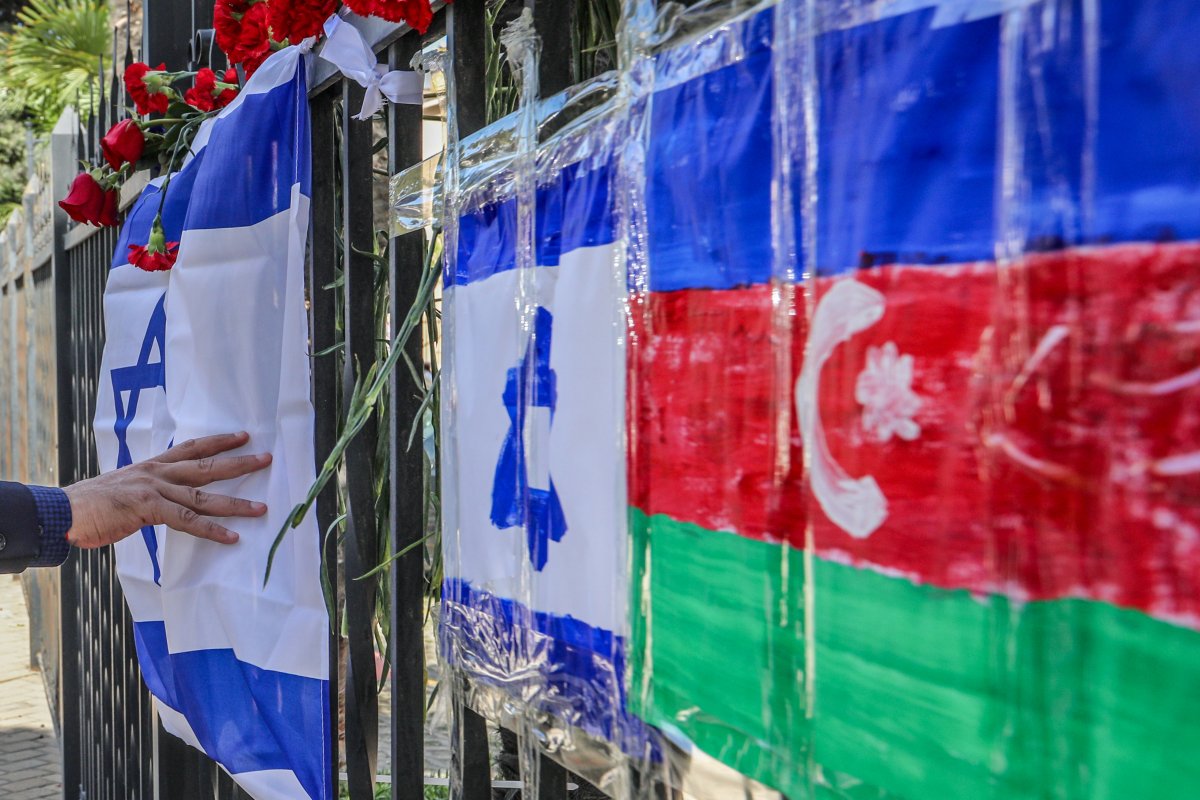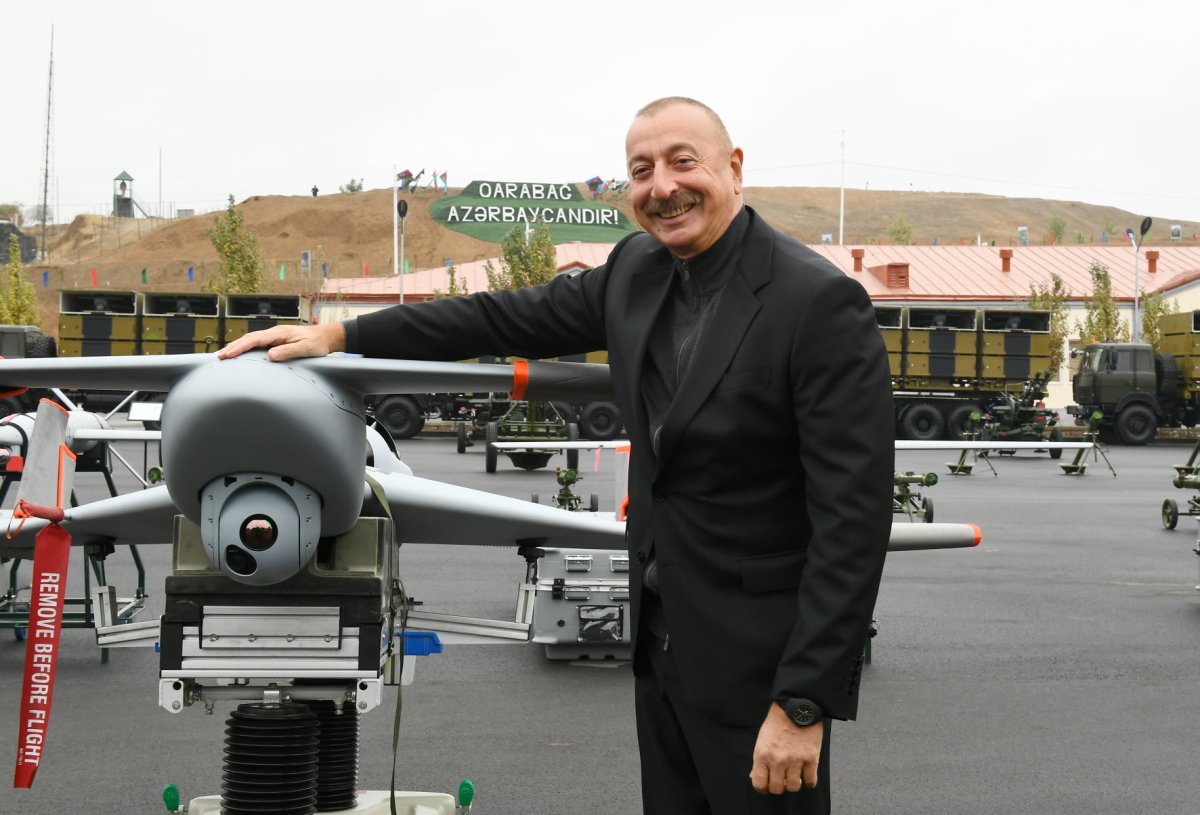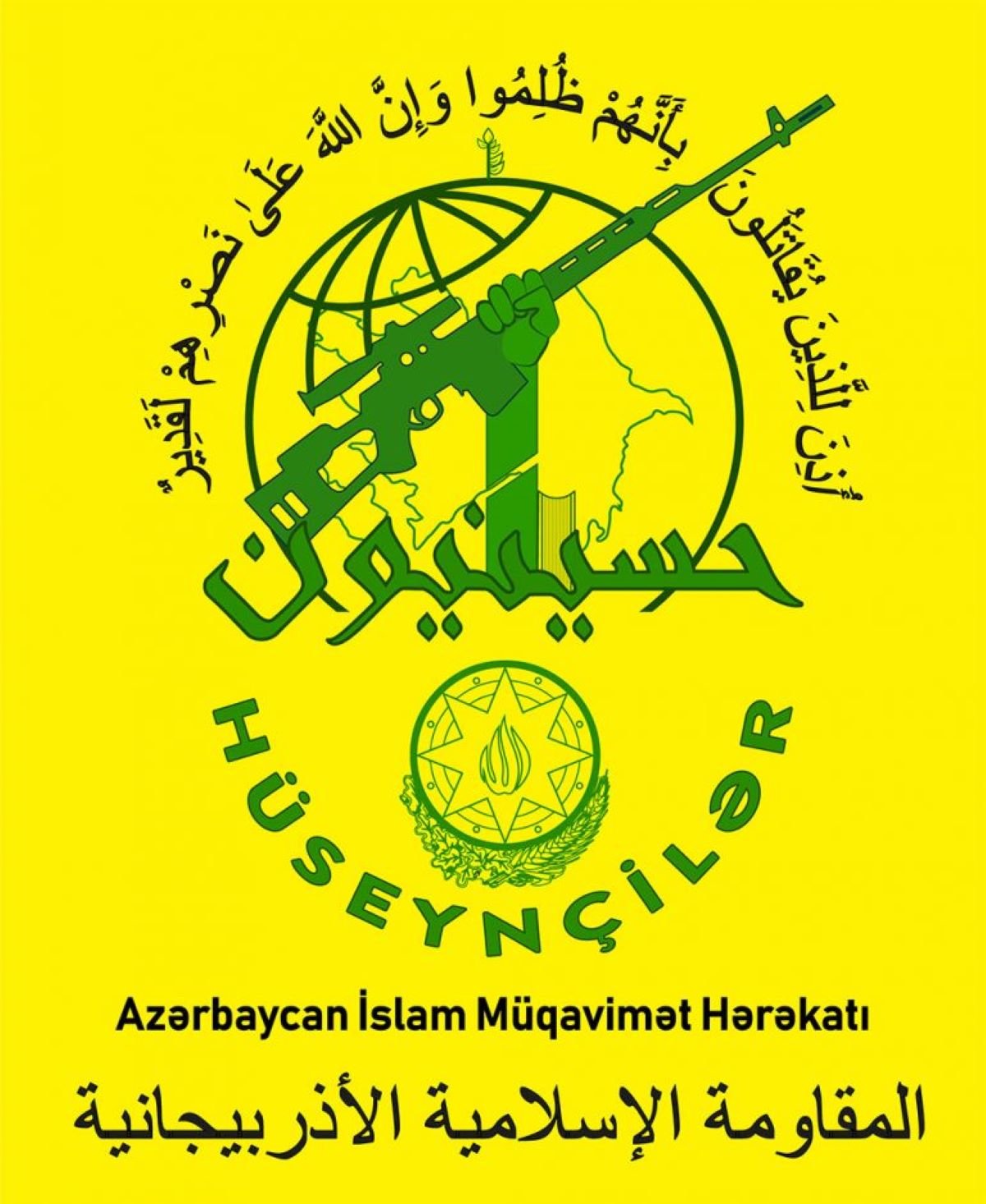Tom O'Connor
\
As Iran becomes more deeply mired in the crises currently ravaging the Middle East, the Islamic Republic is eyeing greater cooperation with a fellow majority-Shiite Muslim neighbor it has long-accused of striking too-close-for-comfort ties with Tehran's top foe.
The Iranian gambit, improving relations with Azerbaijan despite Baku's growing partnership with Israel, would mark a significant shift in a region at the crossroads of continents and competing interests of major powers, including Russia and the United States. But deep-rooted frictions within the Caucasus and abroad still threaten to reignite rivalries and crush the burgeoning, fragile partnership between Baku and Tehran.
Just days after the war between Israel and the Palestinian Hamas movement in Gaza erupted last October, Iran signed a landmark agreement with Azerbaijan to establish a transit route, known as the Aras corridor, allowing Azerbaijan access to its exclave province of Nakhchivan via Iranian territory. The deal was viewed as a crucial step toward preventing a more controversial option, known as the Zangezur corridor, which would see Azerbaijan attempt to force a path through rival Armenia.

Azerbaijani and Israeli national flags are seen in front of the Israeli Embassy in Baku, Azerbaijan, on October 9, 2023. Iran is eyeing greater cooperation with Azerbaijan, who it has long accused of being too.
Already, the two South Caucasus rivals have clashed for decades over the separatist Nagorno-Karabakh region, home for more than three decades to the Armenia-aligned yet internationally unrecognized Artsakh Republic, which was dismantled last September amid decisive Azerbaijani victories, aided by both Israel and Turkey.
Iran, traditionally favoring Armenia, has moved to re-calibrate its approach. Amid the ongoing effort to improve relations with Baku in the wake of a deadly attack against Azerbaijan's embassy in Tehran in January of last year, Iranian Foreign Minister Hossein Amir-Abdollahian went as far as to declare "a new chapter" in the relationship between Iran and Azerbaijan during a meeting last Tuesday with his Azerbaijani counterpart Jeyhun Bayramov.
However, as Emil Avdaliani, a professor at European University in Tbilisi, Georgia, told Newsweek, "this does not mean that the Islamic Republic is happy with the power balance in the South Caucasus."
A Common Cause
The primary driver of the Azerbaijan-Iran reconciliation is a mutual desire for regional stability, geopolitical goodwill and economic prospects, particularly the proposed International North-South Transport Corridor (INSTC) that envisions an ambitious rail route tying India to Russia, with Azerbaijan and Iran in between, according to Avdaliani.
"Iran and Azerbaijan are now both interested in rapprochement because their trade grows, the operation of the International North-South Transport Corridor is expanding and Baku seems to have toned down its ambitions to open the Zangezur corridor," Avdaliani said.
"It fits into Iran's foreign policy strategy when Tehran is trying to normalize its traditionally complicated relations," Avdaliani added. "From its side, Azerbaijan cannot afford having a troubled state of affairs with Iran because the country still has to reach a peace deal with Armenia and is presently criticized by the collective West since the fall of Nagorno-Karabakh."
If realized, the 4,500-mile-long INSTC could provide Iran and Russia with a sanctions-proof path to global trade at a time when both nations have faced growing economic restrictions imposed by Washington.
Iranian President Ebrahim Raisi has set out to mend frayed ties across his nation's borders, from the Caucasus to the Middle East, including through the China-brokered deal to resume relations with Saudi Arabia in March of last year.
Israel Expands Influence
But underlying tensions continue to haunt the dynamic between Baku and Tehran, particularly the quietly growing relations between Azerbaijan and Israel that have intensified since the latest full-scale war over Nagorno-Karabakh erupted in September 2020. Israel is now a leading foreign provider of weapons to Azerbaijan and has become Azerbaijan's top oil customer. The two countries also have established intelligence-sharing mechanisms among other areas of collaboration.
The partnership between Azerbaijan and Israel "is not a new phenomenon, though it dramatically deepened after the Second Karabakh War in 2020," policy analyst Fuad Shahbazov, who previously served as a research fellow for the Center for Strategic Studies and a senior analyst at the Center for Strategic Communications, both based in Baku, told Newsweek.
Prior to this conflict—part of a series of confrontations stemming back to the first major war over Nagorno-Karabakh waged from 1988-1994 amid the collapse of the Soviet Union—Azerbaijan had adopted a cautious approach to comprehensive defense ties with Israel. Baku also maintained regular engagement with Tehran, particularly through the INSTC.
The latest war brought radical shifts to the region, however, and Iran responded to the conflict by mobilizing its forces near its borders with Armenia and Azerbaijan. The Islamic Republic hosted large-scale military exercises on this frontier in 2021 and 2022 as well.
Azerbaijan, for its part, "did not take a step back but instead began openly and loudly praising the defense partnership with Tel Aviv in state media as Israel is one of the few countries that supplies Azerbaijan with sophisticated and modern defense technology," Shahbazov said.
"Therefore, Baku values Israel's partnership a lot and sees it as a counterweight to Iranian threats," he added, pointing out intelligence exchanges between Azerbaijan and Israel.
In fact, after the 2020 conflict, Shahbazov said that "Israeli companies flooded Azerbaijan to participate in the post-war reconstruction of the war-torn Karabakh, particularly in the agriculture field." After the collapse of Artsakh last year, Azerbaijan "even boosted its partnership with Israel to acquire additional modern ammunition and likely UAVs," Shahbazov said.

Azerbaijani President Ilham Aliyev poses with an Israeli-built Harop UAV during a visit to the city of Jabrayil on October 5, 2021. Israel is a leading foreign provider of weapons to Azerbaijan
Divide and Conquer
Beyond the geopolitical contest between Azerbaijan and Iran, the two nations have also accused one another of stoking unrest from within.
For Iran, establishing ties with militias consisting largely of Shiite Muslims has been a key foreign policy strategy. Shiites constitute a majority of the population in Iran, Iraq and Azerbaijan and significant minorities within a number of other countries.
Some of the most well-known forces claiming allegiance to the informal "Axis of Resistance" include Lebanon's Hezbollah, Yemen's Ansar Allah, also known as the Houthis, Afghanistan's Fatemiyoun, Pakistan's Zaynebiyoun and various organizations in Iraq, Syria, Yemen, Bahrain and beyond.
These groups seek to combat the influence of Israel, the U.S. and ultraconservative Sunni Muslim militant groups such as Al-Qaeda and the Islamic State (ISIS).
Less well-known to international audiences among this coalition is the Islamic Resistance in Azerbaijan, also called the Huseyniyun. Like most of the groups that constitute the "Axis of Resistance," the Huseyniyun bear a banner that portrays a raised fist clenching a Soviet-style rifle in the model of Iran's Islamic Revolutionary Guard Corps logo and proclaim alignment to Iranian Supreme Leader Ayatollah Ali Khamenei.
Shahbazov said that in 2021, amid deteriorating ties between Baku and Tehran, Azerbaijani authorities moved to "crackdown on pro-Iranian religious communities in Azerbaijan," arresting dozens and seeking to suppress Iranian influence in the country. He argued that the "Huseyniyun could not obtain the extensive support of the local population due to the secular nature of Azerbaijan's society and Iran's negative image among people after the 2020 war."
He also noted, however, that "Iran will unlikely cease attempts to recruit Azerbaijani citizens and embrace the dissemination of radical ideology propaganda to make Azerbaijan more vulnerable."
Tehran, too, has contended with internal unrest tied to Azerbaijan. A nation of 88 million people, Iran is a multi-ethnic state with a Persian majority but a sizable minority of Azeris, numbering up to a quarter of the population by some estimates. Baku-based groups such as the Southern Azerbaijan National Awakening Movement have sought to unify Iran's Azeri community with Azerbaijan.
But just as the Huseyniyun in Azerbaijan has failed to gain the same traction as other "Axis of Resistance" movements, Ahmad Kazemi, professor of international law and senior researcher of Eurasia in Tehran, argued that Azeris in Iran have resisted longstanding attempts to incite separatism, asserting that Azeris have constituted a majority of Persia's fallen troops in a number of regional wars stemming back to the 16th century.
"Azeris have been instrumental in 'shaping' Iran's history, from the Constitutional Revolution of Iran to the Islamic Revolution, and have always stood for Iran's authority and promotion," Kazemi told Newsweek.
"There has never been an indigenous separatist movement in Azeri areas of Iran," he argued. "Instead, artificial and foreign-backed movements have been attempted by entities such as the Russian czars, Stalinist Soviets, and the Ottomans, all of which have failed due to the resilience of the Azeris."
A Perpetual Flashpoint
While often portrayed as primarily within Russia's sphere of influence given Soviet dominance of the region throughout much of the 20th century, the Caucasus has held historic importance to Iran for centuries, serving as a flash point for military, political and religious conflicts stemming back to antiquity.
"The Caucasus has been a part of Iran for thousands of years, and historically, Iran is considered the 'host country' in this region," Kazemi argued. "The Caucasus is considered a part of Iran's civilizational, cultural and historical domain."
This connection has made Israeli inroads particularly sensitive for the Islamic Republic.
"We should not allow the Caucasus region to become a ground for rivalry between others, otherwise the stability and security of every single country will be jeopardized," Iranian Defense Minister, Brigadier General Mohammad Reza Ashtiani, said while hosting Armenian counterpart Suren Papikyan on Wednesday.
Turkey, a NATO member and another historic power vying for influence in the Caucasus, has also proven itself a leading challenger to Tehran's ties to the region. Kazemi referred to the proposed Zangezur corridor that would cut through Armenia as the "Turani Corridor of NATO," referring to the pan-nationalist Turanism ideology promoted among Turkic, Tatar and Uralic peoples across Eurasia by the Ottoman Empire in the 19th and 20th centuries.
Meanwhile, warming ties between Azerbaijan and Israel, another U.S. ally, have stoked concerns in Iran over the establishment of a "second Israel" in the Caucasus.
The term has traditionally applied to another neighboring region of concern for Tehran, Iraq's semi-autonomous Kurdistan Regional Government area, which has occasionally been subject to missile attack by the Islamic Republic, mostly recently in January with the targeting of alleged Israeli spy headquarters in Erbil. Like Iraq, Syria and Turkey, Iran hosts a substantial Kurdish population along with Kurdish groups who seek to establish an independent state.
However, Kazemi asserted that, "the Republic of Azerbaijan has always held a special allure for the Israeli regime given its Shia-majority population, strategic location as a buffer between Iran and Russia, and its abundant energy resources."
He sai that authorities in Israel "have repeatedly referred to the Republic of Azerbaijan as the 'second homeland of the Jews,' which, of course, is historically groundless."

The logo of the Islamic Resistance in Azerbaijan, also known as the Huseyniyun, as featured by the group's social media presence. The banner follows the "Axis of Resistance" model and portrays a Quranic verse stating.
The Compromise
With no shortage of pressure points in the Azerbaijan-Iran relationship, Nikita Smagin, an expert at the Russian International Affairs Council, said that cooperation between Azerbaijan and Israel only "exacerbates distrust between Baku and Tehran."
Still, he told Newsweek "it's worth noting that cooperation alone does not necessarily imply Azerbaijan acting as an Israeli proxy."
"Therefore, in the current context, a pragmatic partnership between Iran and Azerbaijan remains feasible, although Baku's relations with Israel will likely continue to be viewed as a negative factor for its development," he said.
With the INSTC presenting an enticing connection between Iran and Russia at a time when the two nations are enhancing their economic, military and political ties, Smagin explained how trade relations with Moscow were "crucial" for Tehran. The Iran-Russia partnership has only grown in importance amid reports that Iran has supplied Russia with drones for its ongoing war in Ukraine and Moscow's vows to provide Tehran with advanced aerial and anti-air platforms.
"Maintaining positive relations with Baku is essential for Iran, as a substantial portion of cargo between Russia and Iran passes through Azerbaijan," Smagin said. "The establishment of the Aras Corridor further enhances opportunities for Russian-Iranian trade relations and the development of the INSTC."
No comments:
Post a Comment